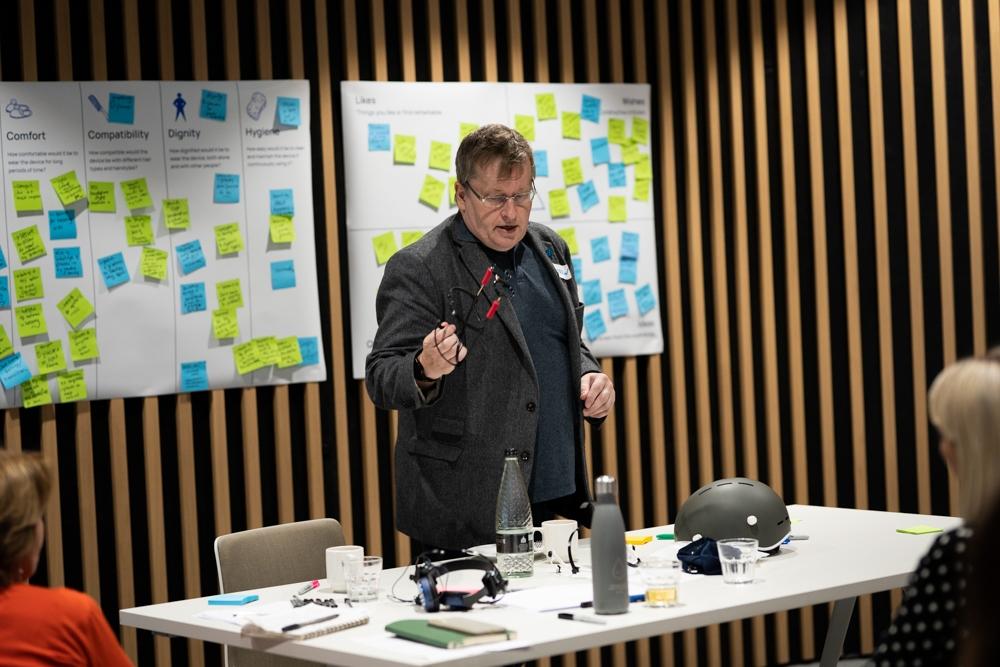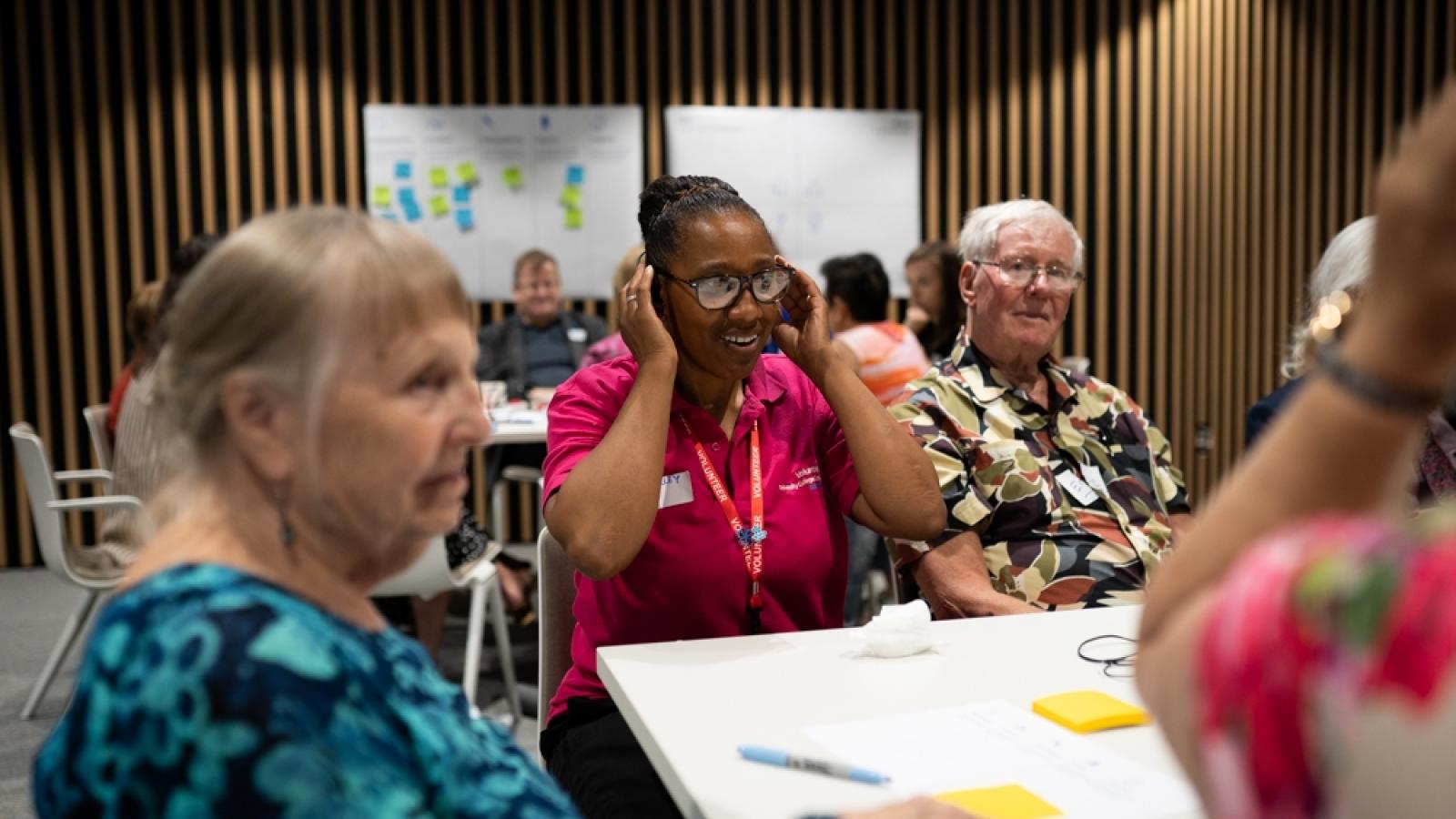The UK DRI exists to improve the lives of those at risk of or living with dementia, and their carers. By involving people with lived experience of neurodegenerative diseases, we believe our research is strengthened, leading to better treatments and technologies for dementia.
Recently, we saw the impact of this approach when running a series of workshops and activities in collaboration with our Lived Experience Group (LEG), the Helix Centre and UK DRI founding funder Alzheimer’s Society. A total of 18 people who are either living with or caring for someone living with dementia, joined the research team to provide invaluable insights. The purpose of this was to understand how best to develop an innovative new brain stimulation technology, which hopes to improve cognition in Alzheimer’s. Their involvement gave unparalleled understanding of the challenges and opportunities needing to be considered when developing such a technology. Find out more about this project in the video and project overview below.
Find out more about this project in the video and project overview below.
Get involved in dementia research
There are a number of ways to shape the future of dementia research at the UK DRI:
- Enquire about joining the UK DRI Lived Experience Group
- Become a “Friend” of the UK DRI’s Care Research and Technology Centre - As a Friend, you’ll be able to hear about upcoming involvement opportunities at the Centre. You can choose your level of involvement and participate as and when you’d like. You’ll have the opportunity to be part of a research community who are shaping how technology can enable people living with dementia to live safely and independently at home.
- Consider signing up to a clinical trial – Dr Nir Grossman is currently recruiting participants for his trial exploring the benefits of brain stimulation
people who are either living with or caring for someone living with dementia, joined the research team to provide invaluable insights
What is the trial?
Dr Nir Grossman, Group Leader at UK DRI at Imperial, is developing a non-invasive deep brain stimulation device which aims to provide therapy for people living with dementia and other cognitive conditions. Similar techniques are already used in Parkinson’s disease treatment but rely on surgical implants. However, Dr Grossman’s innovation is to make the technology non-invasive, using electric fields to stimulate the brain through a headset. This non-invasive approach makes the therapy more accessible to a broader range of people and is being designed for use at home.
Currently, standard stimulation approaches only target the outer regions of the brain and can cause a burning sensation on the skin. In comparison, the technology being pioneered by Dr Grossman targets deep regions of the brain, with minimal sensation. It does however require very precise application of the technology to the head, so a key part of its development is ensuring the headset is designed for easy, but accurate use.
The technology is still in the early stages of development and the team is currently carrying out clinical trials with people living with Alzheimer’s disease. It has been proven safe for use, having already been trialled in healthy humans.
The goal of involving people in this early stage, is to ensure the resulting technology is suitable for users and can have the best possible impact on the lives of people affected by dementia. These activities have included a series of online and in-person workshops and interviews with people affected by dementia, and dementia-related professionals.
What was discussed?
At the most recent workshop, shown in the video, a series of early-stage prototypes of the headset were created to prompt discussion around the human factors the technology needs to consider in order to be usable, acceptable, and accessible. The prototypes were developed using key insights uncovered from a series of previous co-design workshops involving people affected by dementia.
During the workshop, participants were invited to touch, feel, and try on the headsets. As experts by experience, participants gave their honest opinions of the benefits, challenges, and opportunities that might arise from how this technology might translate into life at home.
The co-created outcome of the workshop was a series of design recommendations for how the technology should be developed moving forwards.
Valuable feedback around key topics was received which will be taken into consideration for the next round of designs. This included:
- Repeatability: a simple and intuitive design is needed to allow people to use it without carer support. Accuracy, functionality, and secure fit of the device was highly valued, along with the ability to get feedback if the electrodes are placed correctly.
- Comfort: the device design should be lightweight, adjustable, non-irritable, and secure without making users feel claustrophobic. Making it part of someone’s glasses or headphones were agreed to be comfortable ways of wearing the device.
- Compatibility with diverse hair types: there needs to be a variety of headsets available for users to choose from in the installation phase to cater to each individual’s unique needs.
- Dignity: highly important debate over whether, if the device is used alone at home, the aesthetic of the headset matters less as long as it provides the necessary functions correctly.
- Hygiene: hardware should be wiped down easily and any soft cushioning fabrics included to make the device more comfortable should have the option of being machine washed.

What's next?
The development of this brain stimulation technology is ongoing. We see our partnership with people affected by dementia, who are currently involved in its evolution, as a critical part of this process. This will ensure that the technology is safe and suitable for future use.
We are always looking for more people to contribute to this research. If you’re interested in taking part, please get in touch with Sophie Horrocks (s.horrocks18@imperial.ac.uk).
Thanks to Helix Centre for arranging a stimulating workshop and Alzheimer’s Society for their support.Our greatest thanks to the participants themselves who are members of the Alzheimer’s Society Research Network group and the UK Dementia Research Institute’s Lived Experience Group.
Article published: 02 March 2023
All images and video: Copyright UK DRI Ltd
